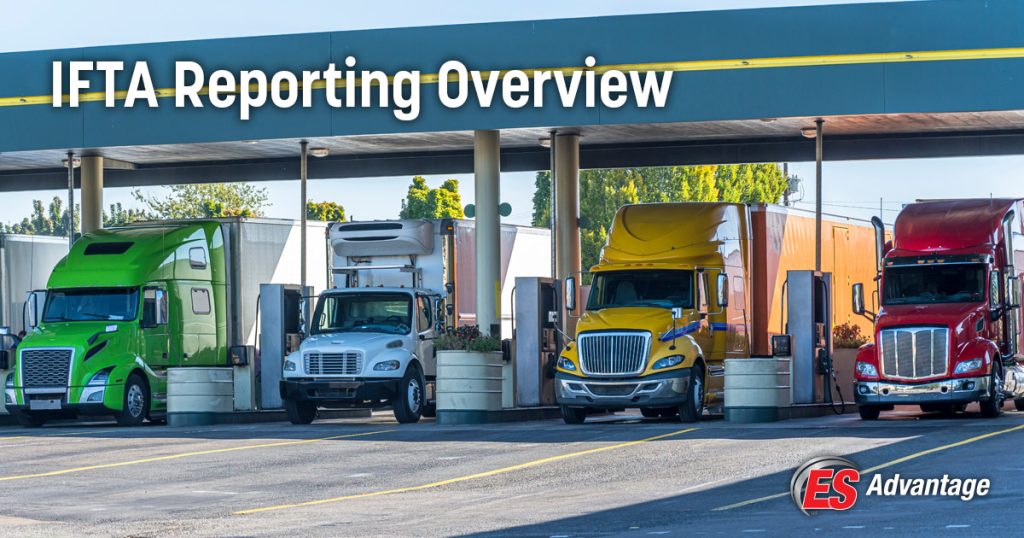IFTA Reporting Overview
With a number of components impacting the process, IFTA reporting can become overwhelming, especially if you are juggling other areas of your business, but the ES Advantage team is here to help.
We’ve provided a breakdown of what you need to know for 2024, including an overview, and frequently asked questions we encounter.

IFTA: The Basics
Before we can jump into the deep end, we need to cover a few basics. Having a clear understanding of the process and how it impacts your business will make filing these quarterly reports much easier in the long run.
What is IFTA?
For motor carriers operating across the United States and Canada, the International Fuel Tax Agreement (IFTA) is ultimately a tool that simplifies fuel tax reporting and reduces the administrative burden for motor carriers that operate in multiple states or provinces.
It eliminates the need for carriers to file separate tax returns in each state they might operate within, instead allowing them to file a single quarterly report in their home state or province.
How does IFTA work?
Under IFTA, carriers receive a single license and decals for their qualifying vehicles. They then track fuel purchases and miles traveled in each participating jurisdiction. At the end of the quarter, they calculate their fuel tax liability based on their average fuel mileage and miles traveled.
Benefits of IFTA
While IFTA filing might seem like a cumbersome process, the truth is that it is much more streamlined than it used to be. Before IFTA, an operator running the IH-10 corridor might have to file as many as eight different tax reports in the corresponding states.
Today, IFTA offers several benefits to motor carriers, including:
- Reduced paperwork
- Saved time
- Minimized risk of errors and penalties
- Enhanced efficiency and compliance
- Equitable tax payment
Eligibility for IFTA
Eligibility for IFTA is fairly simple, as carriers must meet the following three requirements.
- Operate vehicles with a gross vehicle weight rating (GVWR) of 26,000 pounds or more
- Operate in two or more IFTA jurisdictions
- Have a registered business in a state or province that is an IFTA member
While the criteria aren’t overly complicated, it is important to note a couple of things.
- Intrastate carriers, or those that only operate within a single state, are exempt
- Not all states and provinces are members of IFTA including the following:
- US States – Alaska, Hawaii, and the District of Columbia
- Candian Provinces – Nunavut, Yukon Territory, Northwest Territory
- Mexico
Frequently Asked Questions
With the basics out of the way, let’s turn to some of the most frequently asked questions.
What Are The Tax Rates?
The simple answer is that they will vary from one state or province to another and may change from one year to the next. The best way to stay on top of the current tax rates in the jurisdiction your fleet operates within is to use IFTA’s matrix tool → get the tool here.
What Are The Deadlines To File In 2024?
Unlike the tax rates, the dates for filing each year are set in stone. Taxes are due on the last day of the month following the end of each quarter. Here are the dates for 2024:
| (Q1) Jan – March | Due April 30, 2024 |
| (Q2) April – June | Due August 31, 2024 |
| (Q3) July – Sept | Due October 31, 2024 |
| (Q4) Oct – Dec | Due January 31, 2025 |
How Do I File My Quarterly IFTA Reports?
When it comes to filing, each state or province has control over the process and options available but the following options are available to all that qualify.
- Electronically – The date you submit the filing is the date considered received
- By Mail – The postmark on the envelope is the date considered received
- In Person – The date it is delivered to the office is the date considered received
What Happens If I Fail To Pay?
Failing to file a quarterly return within 30 days of the due date is a serious issue that can jeopardize your business. Failure to pay will result in your license being suspended until all taxes, penalties, and interest are resolved.
The penalty amount for a missed filing is $50 or 10% of the net tax liability imposed, whichever is greater.
What Information Do I Need For Filing?
The exact requirements will vary slightly depending on where you plan to file your taxes, but as a good rule of thumb, the following should be gathered each quarter:
- Business information, such as the EIN, the name of the company, the type of business, and the address.
- IFTA details, including country, base jurisdiction, and IFTA Account Number.
- Vehicle information, such as the truck/unit number, gross vehicle type, fuel type, fleet name, fleet number, make, and model.
- The total miles – taxable and nontaxable – traveled by the IFTA licensee’s qualified motor vehicles in all jurisdictions, regardless if they participate in IFTA (including all trip permit miles).
- The total gallons or liters of fuel that is consumed by each qualifying motor vehicle, including taxable and nontaxable, in all jurisdictions, whether they participate in IFTA or not.
Managing IFTA Reporting With ES Advantage
While IFTA reporting is a great tool for fleet owners and owner-operators, the process can be tedious. And for those wearing multiple hats to run their business, it can quickly become a burden, even if the actual act of filing is simpler than it used to be.
To help remove the burden, ES Advantage offers IFTA reporting services for $20 per month, per truck. Our partner handles the entire administrative process, ensuring that your IFTA reporting is accurate and on-time every quarter. To learn more about IFTA services through ES Advantage, connect with our team at 888-566-9877.

